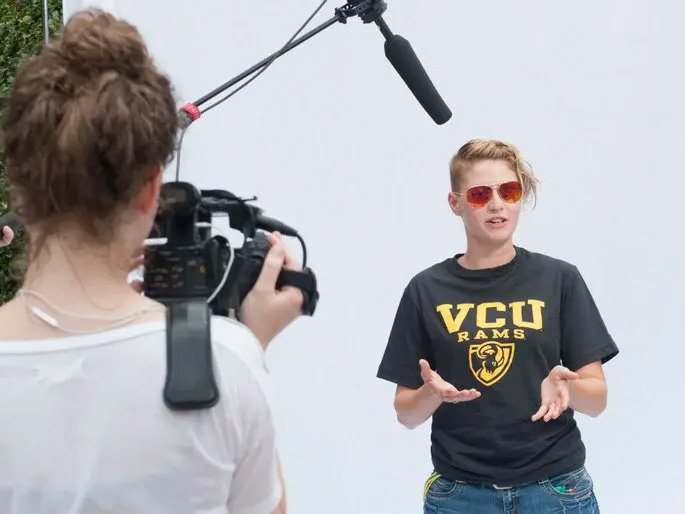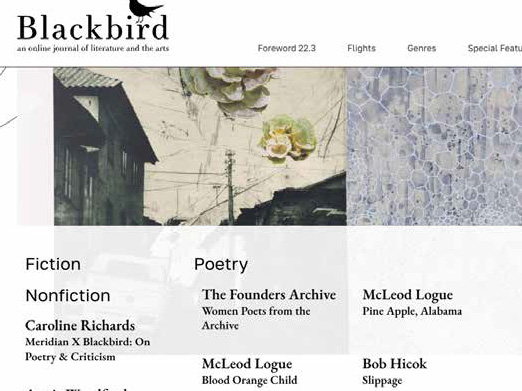News Highlights

Robertson School launches online master’s degree concentration in media leadership
The Robertson School of Media and Culture launched a new mass communications master’s degree concentration in media leadership that prepares students for leadership roles in the news media and other communications fields.
The program provides students with instruction in entrepreneurship and media management skills, as well as soft skills such as time management and best practices for leading a diverse, equitable and inclusive workplace. It’s entirely online, asynchronous, with options to attend full time or part time, and it can be completed in as little as 13 months. The first cohort began in June.
“This curriculum is all about nurturing the next generation of media leaders. The graduate studies team at Robertson has done a fantastic job crafting a curriculum that blends real- world know-how with 21st-century career opportunities,” said Peyton Rowe, professor and director of the Robertson School. “We continue to keep the working professional top of mind in our graduate offerings. Like our integrated communication track, this new option is perfect for folks juggling work and life, offering online flexibility to help them reach their career goals.”

College of Humanities and Sciences spearheads AI education and scholarship
AI technologies are now ubiquitous, from smartphones and smart home devices to complex systems in health care, finance and transportation. In order to meet the needs created by this technological revolution, the College of Humanities and Sciences has expanded its curriculum to include new courses focused on AI.
The Department of Philosophy introduced an Ethics and Philosophy of AI badge in the spring. Students are required to take two courses: Ethics of Artificial Intelligence and Philosophy of Artificial Intelligence. Once these courses are completed, students can add the badge to their resumes or LinkedIn profiles.
“The acceleration of developments in artificial intelligence raises not only technological challenges but also significant conceptual, ethical, legal and broadly societal ones. For that reason, it’s important for philosophy to be involved in discussions around artificial intelligence,” said Donald Smith, Ph.D., chair of the department. “Philosophy can help our students carefully think through the societal ramifications of AI and how to guide its development and use.”
Philosophy is joined by the departments of Mathematics and Applied Mathematics, Statistical Sciences and Operations Research, the Robertson School of Media and Culture and English in offering AI-centered courses. Many of these courses also count toward two new AI minors offered by VCU: practical artificial intelligence and mixed and immersive reality studies.
“Teaching AI is not just about technical skills – it’s about preparing our students to be ethical, critical thinkers in a world increasingly shaped by artificial intelligence,” said Catherine Ingrassia, dean of VCU’s College of Humanities and Sciences. “By integrating AI studies across disciplines, we’re equipping our graduates to navigate the complex intersections of technology, society and human values.”

Online literary journal Blackbird debuts new design, website and revised publishing schedule
Blackbird, the online literary journal founded in 2001 and published by the Department of English, launched a new design and website, and announced a revised publishing schedule in January.
The user-friendly website, blackbird.vcu.edu, features a minimalistic framework with decorative elements that reference the natural landscape of Richmond. The new format also supports more visual art and audio and video projects. It was designed by Red Orange Studio, a Richmond-based design agency.
“We wanted a new design that honored the tradition of the journal,” said English professor and faculty editor Kathy Graber. “The founding editors built Blackbird with a rock-solid foundation and set a high bar. They were meticulous in the presentation and the selection of the quality of writing. This new website will be more fully compatible with current technologies and will also be more conveniently searchable by readers. It will also be fully compliant with current requirements for visitors to the site who may have auditory or visual challenges.”
With the new publication schedule, Blackbird will produce four issues a year, two of which will be themed issues. The previous publication schedule included two issues (fall and spring). Now called flights, the new issues will be shorter than previous editions, although with the same amount of content spread over the year.
Visit blackbird.vcu.edu to view the latest flight.

Dept. of Political Science creates new institute for promotion of democratic values
This year, the Department of Political Science launched the new Institute for Democracy, Pluralism, and Community Engagement (IDPCE) under the direction of Amanda Wintersieck, Ph.D., an associate professor in the Department of Political Science. The mission of the IDPCE is to promote and strengthen democratic values, foster pluralistic societies and empower communities at VCU, in Richmond and beyond.
The IDPCE has three main thrusts: fostering student engagement and experiential learning, providing collaborative programming with the Richmond community and supporting democracy in the international community. So far, the institute has collaborated with VCU Votes, a class dedicated to promoting voter engagement on campus, helped develop a first-year, first-generation program for political science students and engaged undergraduate students in data collection concerning campaign fundraising on social media. It also created the Virginia Government Simulation at VCU and the state capitol. This immersive experience brings together college and community college students from across the state to participate in a realistic legislative simulation.
“We stand at a particular moment in our history where we are engaged in such hostile conversations, both nationally and internationally,” said Wintersieck. “For us at the institute, it’s about getting citizens talking to one another — not talking at each other, not talking over each other, but coming together to think critically about the issues facing democracy and to come up with sustainable ways that we can come together as one.”